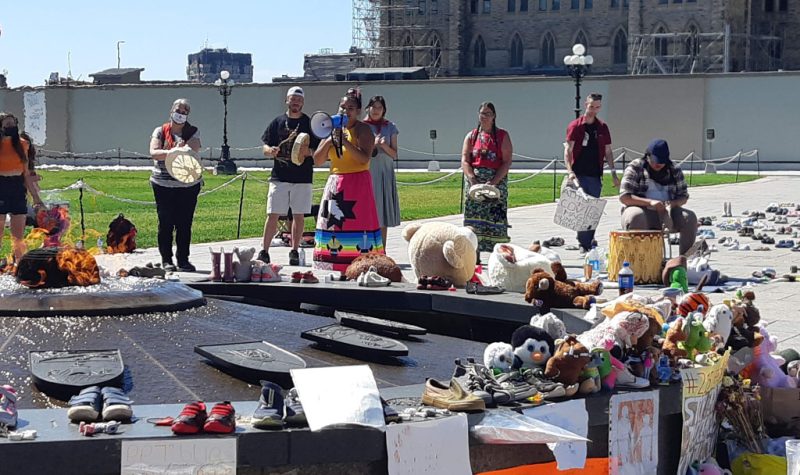Warning: The following story contains details that listeners may find upsetting. If you are in distress, call the Indigenous Hope for Wellness Helpline at -855-242-3310 or the Ontario Crisis line at 1-866-996-0991. If you are in immediate danger, call 911 or go to the nearest hospital.
A drum circle for healing was held at the centennial flame at Parliament Hill yesterday honouring the 215 children found buried at the former Kamloops Indian Residential school.
Organized by Jackie Shigwadjah, the drum circle was hosted two weeks after the tragic findings in Kamloops, B.C. as Indigenous people continue to grieve and try to heal. Shigwadjah hopes to hold drum circles at the centennial flame regularly for as long as the memorial for the Kamloops 215 at Parliament Hill stays set up. Despite COVID-19 restrictions and distancing at the event, Shigwadjah said that she felt the event brought a sense of community that grieving people have been seeking.
“I spent all day at the memorial on Monday,” Shigwadjah said. “I saw many other Indigenous folks, mainly people who have suffered with homelessness and addiction, come seeking ceremony or elders they could speak to. Something within the culture that could help them heal.”
As vigils, actions and other commemorative events take place, Shigwadjah said not only is Indigenous grieving ongoing but Indigenous suffering at the hands of the Canadian government is ongoing as well.
“It never really ended. It’s still open,” Shigwadjah said. “Our people are still being killed and our children are still beign killed in the Child Welfare System.”
The event organizers also wanted to highlight Indigenous excellence and stories of hope. Cedar Iahtail, who supported Shigwadjah in organizing the drum circle, said she is grateful to her parents for breaking the cycle. She said she felt encouraged to celebrate her culture with her family.
“I was raised traditional. I was raised with my culture,” Iahtail said. “When the news broke about the 215 kids in Kamloops, I realized how blessed my siblings and I are. Even though we are first generation survivors, it really hit me then that we are blessed that my parents put in the work to break these generational curses.”
Shigwadjah said that this who want to support Indigenous people during this sad time should ensure they are being good allies.
“Keep on educating yourself. Keep on learning. Really listening to our stories and being respectful about it,” Shigwadjah said. “Also not expecting us to be the ones to educate you because right now we are grieving and healing.”
The organizers asaid that being a good ally involves holding yourself and the people around you accountable every second of every day. They added that it is not productive to expect anything in return for your allyship because the people you support owe you nothing.


